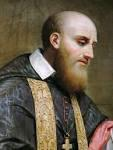St Francis of Sales

Bishop of Geneva. Patron saint of writers and journalists, and a patron saint of the deaf. Francis was born in Savoy in 1567. A delicate child, he was educated at home first and then studied rhetoric, philosophy and theology at the University of Paris. In 1591 he became a Doctor of Law at Padua.
Although he could have had a brilliant career in the world, he refused many opportunities, because he wanted more than anything else to become a priest - much to his father's disappointment.
He eventually won his father's consent and was ordained in 1593. Francis soon became known as a distinguished preacher and for his service to the poor.
In 1593 he made the journey to Chablais to undertake the daunting task of converting the people from Calvinism. In spite of many dangers - there were attempts on his life and he travelled through wild parts of the country inhabited by wolves - he survived, and preached Catholic doctrine with great love and understanding, patience and gentleness. These were to be the main hallmarks of his life. One of his favourite sayings was that 'you can attract more flies with a spoonful of honey than with a whole jar of vinegar.'
St Francis became bishop of Geneva in 1602. He excelled in administrative work, preaching, teaching and spiritual direction. During these years he wrote The Treatise of the Love of God, followed by the Introduction to the Devout Life, which was aimed at lay people. This was instantly acclaimed as filling a long felt need and was translated into several languages. St Francis also devised a sign language in order to communicate with people who are deaf.
One of his best friends was St Jane Frances de Chantal, who founded the Order of the Visitation.
St Francis was very important in the revival of French Catholicism in the 17th century, but his works have appealed to Christians for many generations all over the world.
St Francis died at Lyon in 1622. He was canonised in 1665, and made a Doctor of the Church in 1877.












